- Home
- Nick Hornby
Speaking With the Angel Page 2
Speaking With the Angel Read online
Page 2
I have learned subsequently that my protection officers waited two or three minutes before first knocking on the lavatory door and then, on receiving no reply, breaking it down. By then, however, I was several hundred yards to the south. There was, I repeat, nothing they could have done, and no blame attaches to them in this regard.
Telephone Call to No. 10
At this stage of the evening, as I am sure the House will appreciate, I had no particular plan in mind. It may well be that I was slightly concussed. At any event, I was content simply to follow my footsteps where they led me, enjoying the refreshing sensation of the damp night air. Ferrymead Gardens took me to Millet Road which gave on to Beechwood Avenue and later Melrose Close – street names which, more eloquently than I can hope to do, describe the peaceful English suburb in which I found myself. I felt no sensation of danger; rather the reverse.
I am aware that my actions have since been described in the media as ‘a gross dereliction of duty’ (Daily Telegraph) and ‘an unprecedented endangering of national security’ (The Times). Yet, as the noble lord, Lord Jenkins, has pointed out (in today’s Evening Standard), there is an historical precedent. On the night of 4 May 1915, Herbert Asquith walked from Mansfield Street, near Oxford Circus, to Downing Street, lost in thought about his feelings for Miss Venetia Stanley, who had just disclosed to him her intention of marrying one of his Cabinet colleagues. If one Prime Minister can walk the London streets unprotected during wartime, why cannot another do the same in peacetime? Does a Prime Minister not enjoy the same civil liberties as any other citizen of the United Kingdom? These are questions which the House may wish to ponder.
Of course, I was aware of the undoubted anxiety which I was by now causing to those who were concerned for my welfare. Accordingly, I took steps to reassure them. The duty log of the No. 10 switchboard records that at 6.27 p.m. a caller claiming to be the Prime Minister attempted to make a reverse charge call to the Downing Street Press Office from a public telephone box in Greenford. The same caller tried again two minutes later. On this second occasion I was finally able to convince the switchboard operator of my identity, and my call was put through. The House will thus see that within approximately twenty minutes of my alleged disappearance, my office was aware that I was safe and well and acting of my own free will. So much for the so-called ‘night of frantic worry’ (Daily Mail) to which I am supposed to have subjected them.
My Chief Press Secretary, with characteristic presence of mind, took a careful note of our conversation, and I have arranged for a copy of his record also to be placed in the Library of the House. According to this note, I told him not to worry about me, and reassured him that in due course I would return to Downing Street of my own volition. He frankly disapproved of this plan. He believed my actions would quickly become public and provoke damaging speculation in the media. He urged me in strong terms to stay where I was, adding that he would arrange for my protection officers to pick me up: they were, he informed me, at that very moment patrolling the neighbourhood looking for me. The duty log shows that I terminated this conversation at 7.01 p.m.
It was raining quite steadily by now, the streets were quiet, and the realization was suddenly born upon me that unless I took swift and decisive action to vacate the area, I was likely to face the embarrassing situation of being apprehended by my own security officers. Irrational as it may seem with hindsight, I was seized with a powerful desire to postpone such an encounter, at least for a little while longer. But how was it to be avoided? A taxi, if one could be procured, was the obvious solution. But now I faced a further, and unanticipated, problem.
The House may be aware that the first thing a Prime Minister loses on taking office is his passport, which is removed from him by his Private Office to ease his official travel arrangements. The second thing to go is his ready money. Why, after all, does a Prime Minister need cash? How would he spend it if he had it? Where would he obtain it if he wanted it? The sudden realization that I had no money placed me in a quandary.
It was then that I noticed that the telephone call box in which I was sheltering stood adjacent to a small row of commercial premises. Among them was a branch of my own bank. I had retained my personal cheque card from my days as Leader of the Opposition, and it was the work of but a few moments to hurry across the pavement and insert it into the automatic telling machine (ATM). However, my relief quickly evaporated when I realized I had only a vague recollection of my personal identification number (PIN). On my third attempt to enter my PIN, the ATM informed me that it had retained my card.
My reason for giving the House these apparently minor details is to make it easier to comprehend the sequence of events which followed. I was wearing only a light business suit. I was thoroughly wet. I was cold. I was eager to be on my way. The only object on me, I realized, which had any monetary value, was an inscribed wristwatch, given to me during the last G8 summit by the President of the United States.
The sequence of events by which this wristwatch came to be in the possession of a fifteen-year-old schoolgirl has also excited considerable media speculation, most of it of an utterly fantastical nature. The facts are more prosaic.
‘Miss B’
As luck would have it, no taxis were available to hire in that particular part of Greenford at that time of the evening, either for cash or barter. Venturing into the road, I therefore attempted to flag down a passing motorist. Perhaps not surprisingly, the spectacle of a man bearing a striking resemblance to the Prime Minister, bleeding slightly from a grazed forehead, looming out of the darkness on a rainy Friday night with his suit jacket held over his head, caused him to panic. Far from slowing down, he accelerated away, a pattern of behaviour repeated by several other motorists as I made my way up and down the centre of Ferrymead Avenue in search of assistance.
It was at this point that I became aware of another pedestrian on that stretch of road – a pedestrian bending, as it seemed to me, to unlock the door of a parked car. This other person – a female person – who, because of her age, cannot be named for legal reasons – is the person who has since become known in the media as ‘Miss B’.
I cannot, at this stage, remember precisely which of us initiated the conversation that now took place. It may be that Miss B, as I shall also call her, hailed me in a jocular spirit, or I may have approached her. It is not, in any case, a relevant detail. I naturally assumed her to be the owner of the vehicle beside which she was standing, or at any rate a person authorized by the owner of the vehicle to drive that vehicle away, or, at the very least, the holder of a current UK driver’s licence. I also accepted at face value her explanation that the vehicle was mechanically defective, and therefore needed to be started by the unorthodox procedure of opening the bonnet and connecting certain cables in the ignition, a technique which, my right honourable friend the Home Secretary informs me, is known as ‘hot-wiring’.
Some will no doubt accuse me of naivety in this matter. That is for the House and the country to judge. The essence of the situation is that I asked a person whom I assumed to be a competent driver to give me a lift, that she at first demurred, that I then offered her as payment the wristwatch to which I made reference earlier, and that she then agreed to drive me wherever I wished to go. The whole case is now in the hands of the Crown Prosecution Service and I am advised that it would be prejudicial for me to comment further on a situation where legal action may be pending.
It was, I should estimate, approximately 7.20 p.m. when, with Miss B at the wheel, we pulled out of Ferrymead Avenue at the start of what was to prove an eventful journey. By this time, unknown to me, British Telecom engineers had pin-pointed the precise location of the telephone box from which I had contacted the Downing Street Press Office, my Principal Private Secretary had been alerted, and the Head of Special Branch and the Director-General of the Security Service, in consultation with the Commissioner of the Metropolitan Police, had issued orders for the area to be sealed off. The emergency services
had responded immediately with their usual superb professionalism. The stations of Greenford, South Greenford, Drayton Green and Hanwell had all been closed, and a rudimentary vehicle checkpoint (VCP) was aleady in operation, blocking access from Oldfield Lane South to the Greenford Roundabout.
It was towards this VCP that Miss B now accelerated.
Journey into London
My precise recollection of what followed is hazy. According to Miss B, as quoted in yesterday’s News of the World, I shouted ‘Go, go, go.’ I believe, in fact, that my actual words were ‘No, no, no’ and that, in the heat of the moment, she misheard me. The truth may never be known. What is not in dispute is that an offence was now committed under the provisions of the 1972 Road Traffic Act, in that our vehicle failed to stop when requested to do so by a police officer. I deeply regret this.
In her account of the night’s events, as related in the News of the World, Miss B asserts that she had no idea that I was the Prime Minister. I believe this to be true. She certainly did not seem to me to be the kind of young person who would follow political events at all closely. When I told her who I was, and that the wristwatch which she was now wearing had been given to me by the President of the United States, she responded with an exclamation of frank disbelief.
I am aware that I have been widely criticized for failing to recognize that she was of school age. It was, however, as I have pointed out, dark; I may well have been suffering the effects of concussion; I had lost a contact lens; and the photographs of Miss B reproduced in the News of the World – even with her face masked to protect her identity – show, as I am sure the House would agree, a person of unusually mature appearance.
Her driving skills were also those of a person many years in advance of her true age. The noise of pursuit soon died away and we found ourselves on the A40 heading east, back towards central London – the very road along which I had been travelling to Chequers a bare ninety minutes before.
Honourable Members may perhaps imagine the thoughts which were running through my mind. I was beginning to see that my actions could indeed be open to widespread misinterpretation, as my Chief Press Officer had warned me they would be. It was now clear that a considerable police operation was underway in the Greenford area. I had obviously inconvenienced many people. Given the numbers involved, there was little chance of what had happened not becoming public at some stage. I needed to think quickly what I should do. Miss B took the view, and expressed it forcibly, that continuing on our present course along the A40 would foreshorten that thinking time considerably. I concurred. Accordingly, we left the A40 at the Hanger Lane interchange and joined the North Circular Road.
Perhaps I might now quote to the House from Miss B’s account in the News of the World:
‘I said to him, “Are you really the Prime Minister?” He said he was. He seemed like a nice bloke. He’d gone very quiet. He said he was worried he was going to get me in to a lot of trouble. He said the papers were going to come after me. I said, “No way. You’re kidding me.” He said, “You’ve no idea what they’re like.”
‘He asked if I lived with someone who would look after me? Did I have a husband? I said no way: my dad was inside and my mum had done a runner and I lived with my gran. He said, “So how old are you then? Eighteen? Nineteen?” I said, “Fifteen”, and he kind of groaned and went very quiet again. I thought I’d turn on the radio to cheer him up.’
Mr Speaker, it has been asked – and fairly asked – why, at this stage of the evening, I did not simply direct Miss B to pull off the road, and await the inevitable arrival of the police. With hindsight, of course, this is what I should have done. I was in a vehicle clearly being driven by someone not qualified to do so. But my situation at the time appeared to me more complicated. Miss B has been kind enough to indicate, via the News of the World, that I seemed like ‘a nice bloke’. May I, across the havoc of the past few days, return the compliment, and say that she seemed a nice young woman?
And there was something more. In the drama of the preceding minutes, a bond had sprung up between us – a purely platonic bond, I hasten to add – but a bond nonetheless, which meant that I now felt acutely responsible for the situation in which I had placed her. I knew only too well what was likely to happen to her, a vulnerable schoolgirl, if her part in the night’s events became known to the media. Could some means be found of extricating her from this sorry tangle? Our best hope was surely to remove ourselves as far as possible from the scene of police operations, and it was for this reason, as much as any other, that we continued our journey across London, eventually leaving the North Circular Road at the Brent Cross Shopping Centre, and travelling south down North End Road towards the borough of Hampstead.
‘Mr A’
I have quoted Miss B as telling the News of the World that it was her idea to switch on the car radio. I was frankly curious to know whether any word of the night’s dramas had yet reached the media. As it happened, the owner of the vehicle – to whom I have since written a letter of apology – had left the radio tuned to a news station, and immediately I found myself listening to an interview regarding my recent performance as Prime Minister. The House will perhaps understand if I say that I felt a sudden sensation of dread. My political life, if not exactly passing before my eyes, seemed at any rate to be passing rapidly before my ears. However, as the broadcast continued, I realized that the interview, which was part of a regular political programme, had in fact been pre-recorded. The tone of the comments being broadcast was one of characteristically lofty abuse and I recognized at once the voice of the speaker: a columnist whom I knew personally, and whose work appears regularly in a number of publications, among them the Guardian and the Observer. His name will be familiar to members on both sides of the House. For legal reasons, I shall call him Mr A.
Honourable members who take the trouble to consult the weekly press summary which I have had placed in the Library will see that it contains several quotations from Mr A’s recent journalism. By a curious coincidence, I had been re-reading these quotations earlier in the evening, at around the moment when I was stricken with nausea. In the Guardian, for example, he had written:
‘The Prime Minister is, by common consent, a little man: “a pettyfogging political pygmy”, was how one of his Cabinet colleagues described him at a private meeting last week. The gap between his personal qualities and the importance of the office he holds grows daily ever more embarrassingly apparent.’
And in the Observer:
‘It should surprise no one to learn that the Prime Minister is a liar. Lying, after all, is the essence of the politician’s craft. What should surprise us – and what alarms his colleagues – is that he is such a bad liar. He is a true phoney: an authentic fraud. As one senior Cabinet Minister recently remarked: “He’s the sort of man who, if he kept a brothel, would bring prostitution into disrepute.” ’
There is more in a similar vein, but perhaps the House will excuse me if I confine myself to these two, fairly typical illustrations.
As I said at the outset of my statement, I have always believed strongly in the tradition of robust press comment as an essential part of our democratic system. I have nothing against journalists as such. Far from it. I had seen Mr A socially on a number of occasions, both before and after I became Prime Minister. I had been to his house. He had been to mine. He had sent me his books when they were published. I had presented his recent award at the annual What the Papers Say lunch when he was made Columnist of the Year. I had always made efforts to be friendly towards him. His position in the political spectrum was roughly the same as mine. He should have been, if not a friend, then at least an ally. Yet in print, for reasons I had never understood, he adopted a stance of unwavering criticism. I return to the account given by Miss B:
‘This posh guy on the radio was really slagging him off, so I said something like, “Sounds like this f***er really hates your guts.” And he said, “Yes, but he’s always very nice to my face.” So I
said, “You mean to tell me you know the guy?” And he said, yes he did, that he used to see him a bit. And I said, “Well, it’s none of my business, but don’t you think he’s due a sorting, the way he’s going on?” And he looked out of the window and he thought about it for a bit, and then he said that funnily enough the f***er lived somewhere around here.’
Incident in Hampstead
In deciding to visit Mr A at his home I was aware that I was embarking on a potentially hazardous course. On the other hand, I took the view that I was by this stage
‘… in blood
Stepped in so far that, should I wade no more,
Returning were as tedious as go o’er.’
By which I do not mean to imply that I consciously intended to do Mr A any actual physical injury, but rather that I had by now concluded that my recent actions would, regardless of what I did, become public knowledge very soon. Once that happened, it did not require much effort on my part to imagine what Mr A himself would have to say about my conduct. The prospect of for once seizing the initiative – of, to use Miss B’s phrase, giving him ‘a sorting’, whatever that may mean – held a certain undeniable appeal.
As I have already told the House, our route from Greenford had now carried us as far as Hampstead, the district in which Mr A has for many years lived. I know the area well. As a backbench MP, I had lived around the corner from Mr A in a basement flat. His own, substantial, four-storey house was familiar to me, and I directed Miss B to the appropriate street. For a moment, after we had parked outside, I hesitated. Was this, on reflection, really a sensible course? But then I resolved that I would continue. The media, after all, had frequently turned up uninvited on my doorstep over the years. Why should I not do the same to one of them? I left the car and rang the bell. Mr A himself answered the door.

 Funny Girl
Funny Girl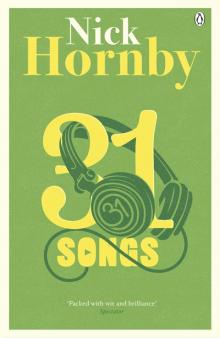 31 Songs
31 Songs Fever Pitch
Fever Pitch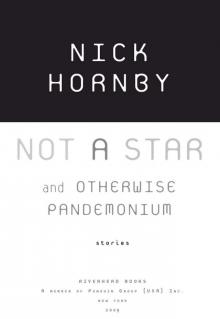 Not a Star and Otherwise Pandemonium
Not a Star and Otherwise Pandemonium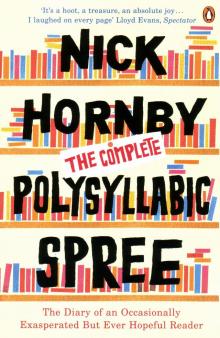 The Complete Polysyllabic Spree
The Complete Polysyllabic Spree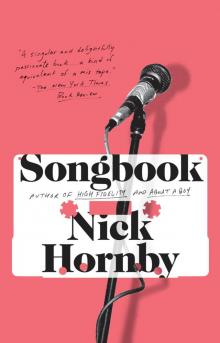 Songbook
Songbook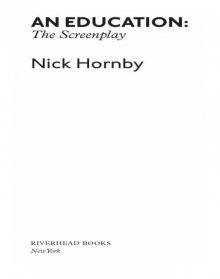 An Education
An Education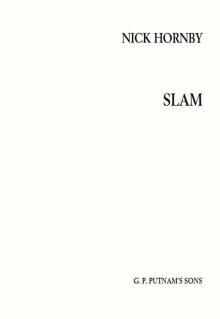 Slam
Slam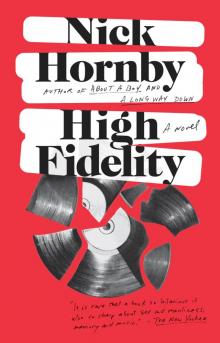 High Fidelity
High Fidelity Speaking With the Angel
Speaking With the Angel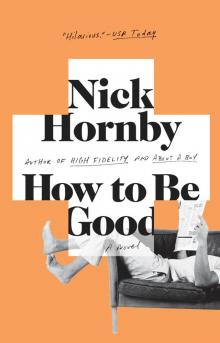 How to Be Good
How to Be Good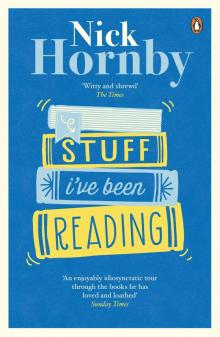 Stuff I've Been Reading
Stuff I've Been Reading About a Boy
About a Boy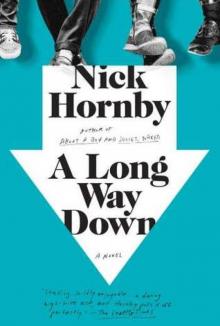 A Long Way Down
A Long Way Down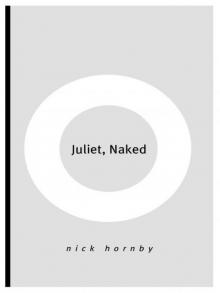 Juliet, Naked
Juliet, Naked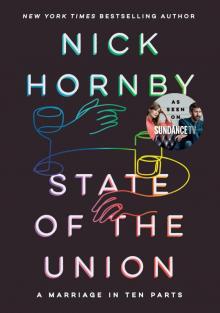 State of the Union
State of the Union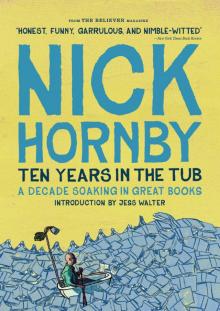 Ten Years in the Tub: A Decade Soaking in Great Books
Ten Years in the Tub: A Decade Soaking in Great Books Books, Movies, Rhythm, Blues: Twenty Years of Writing About Film, Music and Books
Books, Movies, Rhythm, Blues: Twenty Years of Writing About Film, Music and Books Just Like You
Just Like You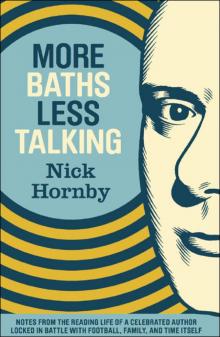 More Baths Less Talking
More Baths Less Talking Books, Movies, Rhythm, Blues
Books, Movies, Rhythm, Blues